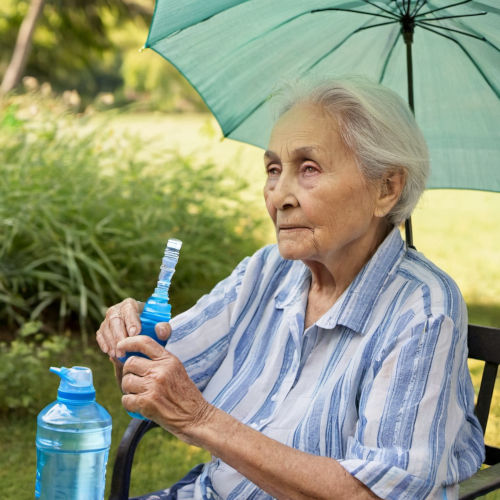Climate change isn't just about melting ice caps and rising sea levels. It also has a significant impact on the health and safety of seniors and older adults. As temperatures rise and extreme weather events become more common, it's important to understand how these changes can affect older adults and what steps can be taken to stay safe. In this article, we will explore the main ways climate change impacts seniors and offer practical tips for staying healthy.
1. Health Risks from Extreme Heat
Extreme heat is one of the most direct ways that climate change affects older adults. As global temperatures rise, heatwaves are becoming more frequent and severe. Seniors are especially vulnerable to the health risks of extreme heat.
Health Impacts:
- Heat Exhaustion and Heatstroke: Seniors are more likely to suffer from heat exhaustion or heatstroke, conditions that occur when the body overheats and can't cool down. Symptoms include heavy sweating, weakness, dizziness, nausea, and even confusion.
- Preexisting Health Conditions: Older adults with heart disease, respiratory problems, or other chronic conditions are at a higher risk of complications during heatwaves.
Tips for Staying Safe:
- Stay Hydrated: Drink plenty of water throughout the day. Avoid alcohol and caffeine, which can lead to dehydration.
- Stay Cool: Use fans, air conditioning, or visit cooling centers during heatwaves. Wear lightweight, light-colored clothing, and avoid going outside during the hottest parts of the day.
- Check In: Have family members or friends check in on you during heatwaves to make sure you're safe and comfortable.
2. Health Impacts from Poor Air Quality
Poor air quality is another significant concern related to climate change. Increased pollution from wildfires, industrial activity, and vehicle emissions can lead to worsened air quality, which has serious health effects for older adults.
Health Impacts:
- Respiratory Issues: Poor air quality can lead to respiratory problems like asthma and chronic bronchitis. Older adults with existing respiratory conditions are at greater risk.
- Heart Disease: Long-term exposure to air pollution can worsen heart disease and increase the risk of heart attacks.
Tips for Staying Safe:
- Stay Indoors: On days when air quality is poor, try to stay indoors as much as possible. Keep windows and doors closed to prevent polluted air from entering your home.
- Use Air Purifiers: Consider using air purifiers with HEPA filters to reduce indoor air pollution.
- Monitor Air Quality: Check the air quality index (AQI) on weather apps or local news to stay informed about pollution levels in your area.
3. Risks from Extreme Weather Events
Extreme weather events like hurricanes, floods, and severe storms are becoming more common due to climate change. These events can be particularly dangerous for older adults.
Health Impacts:
- Injury and Displacement: Seniors are at a higher risk of injury from falling objects or getting caught in floods and storms. Extreme weather can also displace people from their homes.
- Access to Medical Care: During and after extreme weather events, it may be harder for seniors to access medical care, medications, or emergency services.
Tips for Staying Safe:
- Prepare an Emergency Kit: Keep an emergency kit with essentials like water, non-perishable food, medications, a flashlight, and batteries.
- Create an Evacuation Plan: Have a plan in place for evacuating your home in case of a disaster. Know where you will go and how you will get there.
- Stay Informed: Follow weather updates and warnings from local authorities to stay aware of any severe weather events.
4. Mental Health Challenges Due to Climate Change
Climate change can also affect mental health, particularly for older adults who may feel overwhelmed by the changes and challenges brought by climate-related issues.
Mental Health Impacts:
- Stress and Anxiety: The fear of extreme weather, financial concerns, and the stress of adapting to climate changes can lead to increased anxiety and depression.
- Feeling Overwhelmed: Seniors might feel helpless or overwhelmed by the scale of climate change and its impacts on their lives.
Tips for Managing Mental Health:
- Seek Support: Talk to friends, family, or a mental health professional about your feelings and concerns.
- Stay Engaged: Stay involved in community activities and volunteer opportunities to reduce feelings of isolation and helplessness.
- Practice Self-Care: Engage in activities that help you relax and feel good, such as reading, gardening, or exercising.
5. Conclusion: Taking Action for a Safer Future
Climate change presents numerous challenges for seniors, from health risks due to extreme heat and poor air quality to the dangers of extreme weather events and mental health issues. However, by staying informed and taking proactive steps, older adults can protect themselves and improve their well-being.




